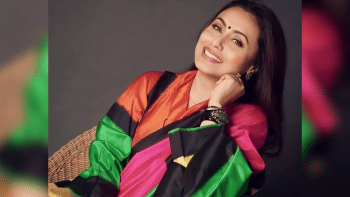Why do we still need ‘dark make-up’ in our media?

There have been a few promotional pictures of actress Tasnia Farin, which have been making rounds on social media. These pictures were posted to reveal the new "look" of her upcoming series "Nitur Jonno".
Directed by Mohammad Mostofa Kamal Raz, the photos did raise quite a few eyebrows. The photos in question show Farin in a darker shade of makeup, and not just a light tan. Farin in her own right is a beautiful brown woman, whose features seemed to have been neutralised with make up of three shades darker, to give her the "look" of a darker-skinned woman. In this day and age, the first thing that might pop into one's mind is that, why couldn't the director have just casted someone of the shade that he was looking for?
Bangladesh, as a twice-liberated country, has a long standing culture of colourist oppression. It is all the result of the colonial hangover that hasn't left us even more than 200 years later. What truly does strike as odd is the dichotomy of our own media, who were so responsive over the 'Black Lives Matter' movement two years ago, don't actually move a muscle when microaggressions of such nature occur in our own surroundings. I call it microaggression because in the grander scale, Tasnia wearing three shades of darker makeup is nothing compared to the skin brightening ads, Fair and Lovely cream or the tiktoks our netizens can be seen making, making before and afters of people being sad and 'ugly' when dark, and instantly glamourise with bright makeup.
If we were to funnel down and circle back to the Tasnia Farin matter, it should be noted that her role could have simply passed to a darker skinned actress. Now if the director or casting director were to argue about creative liberty, which is often an umbrella to hide behind; I'd say that there are thousands of darker skinned actresses in the country that could have fit into the requirements Farin has. Moreover, this would have increased the talent pool and made our industry more inclusive; where darker skinned popular actresses are rarely seen.
Think about it, looking back at the list of popular actresses, who are still relevant might I add, are on the darker end of the spectrum? Even if we have moved into the 21st century, we have still yet to dispose of the primitive notions of equalling fairness to beauty. All of which can be seen in day-to-day incidents from choosing a 'fair' bride for your son to showing ads where you receive a job IF your skin is lighter.
Another question that "Nitur Jonno" might incite is, what type of plot requires a person's skin to be a pivotal point? Is that not ingrained colorism? I am fairly sure we have reached a time of globalisation and multiculturalism where we can move past the need for glorification of long-standing oppressive practices. Also, if the requirement of darkening Farin's skin was to tell a story about colourism and how the heroine beats it-that would make it a merry-go-round, solving nothing ultimately.
Maliha Mashiat is a sub-editor of Arts & Entertainment, The Daily Star.

 For all latest news, follow The Daily Star's Google News channel.
For all latest news, follow The Daily Star's Google News channel. 










Comments